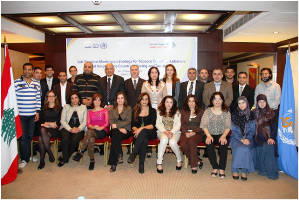 The meeting gathered participants from Egypt, Lebanon, Jordan and the occupied Palestinian territory. As part of the World Health Organization Lebanon tobacco programme a subregional meeting on tobacco pricing and taxation was held in Beirut on the 26 November 2013 in order to update relevant stakeholders on global directions and strategic measures related to tobacco control. Another objective was to coordinate and exchange experiences between neighbouring countries with regard to unifying purchasing prices, increasing taxes, decreasing smuggling, developing policies and implementing regulations on tobacco control.
The meeting gathered participants from Egypt, Lebanon, Jordan and the occupied Palestinian territory. As part of the World Health Organization Lebanon tobacco programme a subregional meeting on tobacco pricing and taxation was held in Beirut on the 26 November 2013 in order to update relevant stakeholders on global directions and strategic measures related to tobacco control. Another objective was to coordinate and exchange experiences between neighbouring countries with regard to unifying purchasing prices, increasing taxes, decreasing smuggling, developing policies and implementing regulations on tobacco control.
Participants from the Lebanese government included representatives of the Ministries of Economy, Finance, Information, Interior and Municipalities, Foreign Affairs, Justice, Public Health, Tourism, Education and Higher Education, Directorate of Customs, the Office of the Prime Minister and the parliamentary health committee. The head of taxation department of Egypt also participated in addition to members of the civil society including the American University of Beirut, Green Hand, Islamic Health Society, YMCA and the head of the Healthy City Program subcommittee on Tobacco Control.
At the end of the meeting, participants agreed on the following recommendations.
- Tobacco taxation is the most effective policy in reducing tobacco use. Lebanon and neighbouring countries should strive to increase tobacco tax and price on a regular basis in order to reduce the tobacco health burden.
- Illicit trade of tobacco products can be effectively tackled through strong control and customs intelligence. An important mean for countries to improve the fight against illicit trade of tobacco is to adopt WHO Framework Convention on Tobacco Control (FCTC) Protocol to Eliminate Illicit Trade in Tobacco Products. This will also help facilitate communication and exchange of information between countries and effectively reduce smuggling.
- Tobacco growing presents risks for health and for the environment. Therefore, Lebanon and neighbouring countries should provide support to tobacco farmers in order to find alternatives.
- It is recommended to establish and strengthen a multi-sectorial task force in each of the countries to implement tobacco control.
- Different tobacco control policies should be implemented and enforced to effectively reduce tobacco use (MPOWER policies).
- The tobacco industry should be blocked from interfering in any tobacco control related policies; especially in the area of taxation. Countries should develop national guidelines in line with the WHO FCTC Article 5.3 guidelines.
Next step agreed action points include the following.
- Conduct situation analyses on the tobacco taxation structure and revenues in each country.
- Undertake a regional summary based on results and share them with countries.
- Undertake in depth studies estimating the health and economic impact of tobacco use in countries.
- The countries should convene yearly follow up meeting/training workshops to be held between the different sectors. The next meeting should take place at the end of 2014, neighbouring countries should be encouraged to attend the meeting(s).
- Undertake technical scientific visits between countries’ teams to exchange experiences and learn about best practices.
- WHO to support tobacco control programmes in general and tobacco taxation in particular.
- The Ministry of Finance should assign focal point(s) to participate in the meetings and discussions related to tobacco control.


